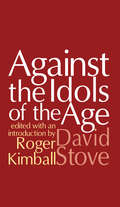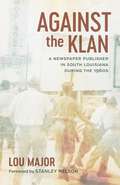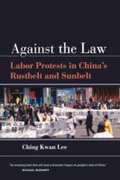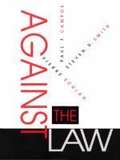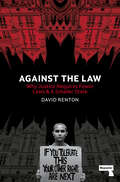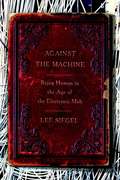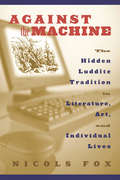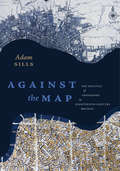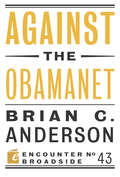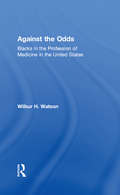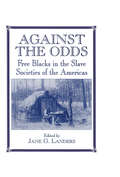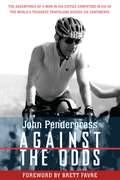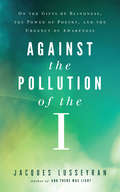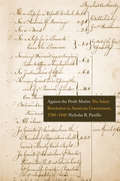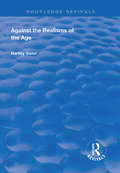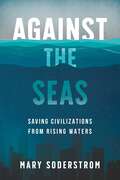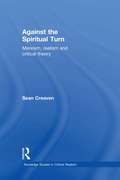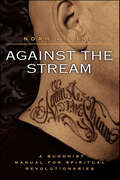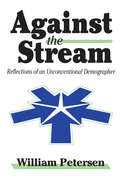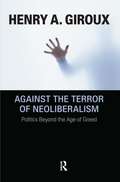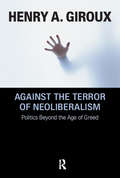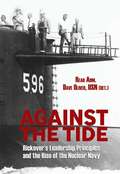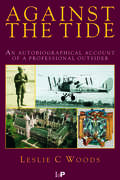- Table View
- List View
Against the Idols of the Age
by David StoveLittle known outside his native Australia, David Stove was one of the most illuminating and brilliant philo-sophical essayists of the postwar era. A fearless at-tacker of intellectual and cultural orthodoxies, Stove left powerful critiques of scientific irrationalism, Dar-winian theories of human behavior, and philosophi-cal idealism. He was also an occasional essayist of considerable charm and polemical snap. Stove's writ-ing is both rigorous and immensely readable. It is, in the words of Roger Kimball, "an invigorating blend of analytic lucidity, mordant humor, and an amount of common sense too great to be called 'common.'" Against the Idols of the Age brings together a repre-sentative selection of Stove's writing and is an ideal introduction to his work.The book opens with some of Stove's most impor-tant attacks on irrationalism in the philosophy of sci-ence. He exposes the roots of this fashionable attitude, tracing it through writers like Paul Feyerabend andThomas Kuhn to Karl Popper. Stove was a born controversialist, so it is not surpris-ing that when he turned his attention to contemporary affairs he said things that are politically incorrect. The topical essays that make up the second part of the book show Stove at his most withering and combative. Whether the subject is race, femi-nism, the Enlightenment, or the demand for "non-coercive philosophy," Stove is on the mark with a battery of impressive arguments expressed in sharp, uncompromis-ing prose. Against the Idols of the Age concludes with a generous sampling of his blistering attacks on Darwinism.David Stove's writings are an undiscovered treasure. Although readers may dis-agree with some of his opinions, they will find it difficult to dismiss his razor-sharp arguments. Against the Idols of the Age is the first book to make the full range of this important thinker available to the general reader.
Against the Klan: A Newspaper Publisher in South Louisiana during the 1960s (Media and Public Affairs)
by Lou MajorIn 1964, less than one year into his tenure as publisher of the Bogalusa Daily News, New Orleans native Lou Major found himself guiding the newspaper through a turbulent period in the history of American civil rights. Bogalusa, Louisiana, became a flashpoint for clashes between African Americans advocating for equal treatment and white residents who resisted this change, a conflict that generated an upsurge in activity by the Ku Klux Klan. Local members of the KKK stepped up acts of terror and intimidation directed against residents and institutions they perceived as sympathetic to civil rights efforts. During this turmoil, the Daily News took a public stand against the Klan and its platform of hatred and white supremacy.Against the Klan, Major’s memoir of those years, recounts his attempts to balance the good of the community, the health of the newspaper, and the safety of his family. He provides an in-depth look at the stance the Daily News took in response to the city’s civil rights struggles, including the many fiery editorials he penned condemning the KKK’s actions and urging peaceful relations in Bogalusa. Major’s richly detailed personal account offers a ground-level view of the challenges local journalists faced when covering civil rights campaigns in the Deep South and of the role played by the press in exposing the nefarious activities of hate groups such as the Klan.
Against the Law
by Ching Kwan LeeThis study opens a critical perspective on the slow death of socialism and the rebirth of capitalism in the world's most dynamic and populous country. Based on remarkable fieldwork and extensive interviews in Chinese textile, apparel, machinery, and household appliance factories, Against the Law finds a rising tide of labor unrest mostly hidden from the world's attention. Providing a broad political and economic analysis of this labor struggle together with fine-grained ethnographic detail, the book portrays the Chinese working class as workers' stories unfold in bankrupt state factories and global sweatshops, in crowded dormitories and remote villages, at street protests as well as in quiet disenchantment with the corrupt officialdom and the fledgling legal system.
Against the Law
by Pierre Schlag Steven D. Smith Paul F. CamposA fundamental critique of American law and legal thought, Against the Law consists of a series of essays written from three different perspectives that coalesce into a deep criticism of contemporary legal culture. Paul F. Campos, Pierre Schlag, and Steven D. Smith challenge the conventional representations of the legal system that are articulated and defended by American legal scholars. Unorthodox, irreverent, and provocative, Against the Law demonstrates that for many in the legal community, law has become a kind of substitute religion--an essentially idolatrous practice composed of systematic self-misrepresentation and self-deception.Linked by a persistent inquiry into the nature and identity of "the law," these essays are informed by the conviction that the conventional representations of law, both in law schools and the courts, cannot be taken at face value--that the law, as commonly conceived, makes no sense. The authors argue that the relentlessly normative prescriptions of American legal thinkers are frequently futile and, indeed, often pernicious. They also argue that the failure to recognize the role that authorship must play in the production of legal thought plagues both the teaching and the practice of American law. Ranging from the institutional to the psychological and metaphysical deficiencies of the American legal system, the depth of criticism offered by Against the Law is unprecedented.In a departure from the nearly universal legitimating and reformist tendencies of American legal thought, this book will be of interest not only to the legal academics under attack in the book, but also to sociologists, historians, and social theorists. More particularly, it will engage all the American lawyers who suspect that there is something very wrong with the nature and direction of their profession, law students who anticipate becoming part of that profession, and those readers concerned with the status of the American legal system.
Against the Law: Why Justice Requires Fewer Laws and a Smaller State
by David RentonOne of Britain&’s leading barristers argues for a world in which the law should play a smaller part in all our lives.Understanding the main political projects of our times, and their plans to expand or shrink the law, is the first step towards achieving greater equality and averting climate disaster.Since 2016, Britain has been ruled by populists, who promise to expand democracy and shrink the law by taking back power from the European Union. Yet what these populists have actually done in power is institute a vast increase in new laws, made by ministers and not Parliament, regulating every aspect of our lives.This move of promising less law while actually expanding it, has been characteristic of our lives for forty years, ever since the neoliberal counter-revolution. Every year, new criminal offences are created; new regulations are introduced. Renton&’s book dares us to imagine a world in which workers are winning, and ecocide treated with the urgency that it deserves. These changes can only come about, he argues, if the movements of the oppressed choose to disengage from the law.
Against the Machine: Being Human in the Age of the Electronic Mob
by Lee SiegelThe new situation doesn't represent the lack of community suddenly produced by the Internet. That is the hackneyed complaint made, again and again, by people who don't seem to have thought through the unlovely aspects of community- its smug provincialism and punitive conventionalism, its stasis and xenophobia- which was in any case jeopardized and transformed by the advent of modernity two hundred years ago. The simple fact is that sometimes you don't want the quiet conformities induced by community; sometimes you simply want to be alone, yet together with other people at the same time. The old-fashioned cafe provided a way to both share and abandon solitude, a fluid, intermediary experience that humans are always trying to create and perfect. The Internet could have been its fulfillment. But sitting absorbed in your screen world is a whole other story. You are socially and psychologically cut off from your fellow caffeine addicts, but mentally beset by e-mails, commercial pop-ups, and a million temptations that may enchant in the moment- aimed as they are at your specific and immediate interests and desires -but in retrospect are time-wasting ephemera.
Against the Machine: The Hidden Luddite Tradition in Literature, Art, and Individual Lives
by Nicols FoxFrom the cars we drive to the instant messages we receive, from debate about genetically modified foods to astonishing strides in cloning, robotics, and nanotechnology, it would be hard to deny technology's powerful grip on our lives. To stop and ask whether this digitized, implanted reality is quite what we had in mind when we opted for progress, or to ask if we might not be creating more problems than we solve, is likely to peg us as hopelessly backward or suspiciously eccentric. Yet not only questioning, but challenging technology turns out to have a long and noble history.In this timely and incisive work, Nicols Fox examines contemporary resistance to technology and places it in a surprising historical context. She brilliantly illuminates the rich but oftentimes unrecognized literary and philosophical tradition that has existed for nearly two centuries, since the first Luddites--the ""machine breaking"" followers of the mythical Ned Ludd--lifted their sledgehammers in protest against the Industrial Revolution. Tracing that current of thought through some of the great minds of the 19th and 20th centuries--William Blake, Mary Shelley, Charles Dickens, John Ruskin, William Morris, Henry David Thoreau, Ralph Waldo Emerson, Robert Graves, Aldo Leopold, Rachel Carson, and many others--Fox demonstrates that modern protests against consumptive lifestyles and misgivings about the relentless march of mechanization are part of a fascinating hidden history. She shows as well that the Luddite tradition can yield important insights into how we might reshape both technology and modern life so that human, community, and environmental values take precedence over the demands of the machine.In Against the Machine, Nicols Fox writes with compelling immediacy--bringing a new dimension and depth to the debate over what technology means, both now and for our future.
Against the Map: The Politics of Geography in Eighteenth-Century Britain
by Adam SillsOver the course of the seventeenth and eighteenth centuries, the increasing accuracy and legibility of cartographic projections, the proliferation of empirically based chorographies, and the popular vogue for travel narratives served to order, package, and commodify space in a manner that was critical to the formation of a unified Britain. In tandem with such developments, however, a trenchant anti-cartographic skepticism also emerged. This critique of the map can be seen in many literary works of the period that satirize the efficacy and value of maps and highlight their ideological purposes. Against the Map argues that our understanding of the production of national space during this time must also account for these sites of resistance and opposition to hegemonic forms of geographical representation, such as the map.This study utilizes the methodologies of critical geography, as well as literary criticism and theory, to detail the conflicted and often adversarial relationship between cartographic and literary representations of the nation and its geography. While examining atlases, almanacs, itineraries, and other materials, Adam Sills focuses particularly on the construction of heterotopias in the works of John Bunyan, Aphra Behn, Jonathan Swift, Daniel Defoe, Samuel Johnson, and Jane Austen. These "other" spaces, such as neighborhood, home, and country, are not reducible to the map but have played an equally important role in the shaping of British national identity. Ultimately, Against the Map suggests that nation is forged not only in concert with the map but, just as important, against it.
Against the Megamachine: Essays on Empire and its Enemies
by David WatsonDavid Watson's wide-ranging essays ponder such themes as the state, empire and war, humanity's tragic relation to the natural world, and the contemporary mass society generated by industrial capitalism and modern technology. His impassioned critique offers a vision of social transformation open to diverse possibilities, and suggests where a new politics must begin: as a radical challenge to the mystique of progress, in defense of nature, memory and spirit.
Against the Obamanet
by Brian C. AndersonThe Internet is a platform of ceaseless innovation that has transformed our lives in a remarkably short time. And the United States has led that revolution: of the 15 largest websites in the world, 10 are American. But all that is now under threat. In February 2015, the Federal Communications Commission imposed extensive regulatory controls on this vibrant digital universe in an effort to mandate "network neutrality. ” In this Broadside, Brian C. Anderson explains how the FCC’s power grab for "neutrality” could be devastating for the most dynamic sector of the U. S. economy. Network neutrality is at odds with everything that made today’s Internet the market cornucopia that it is, and we must protect it from the encroach¬ments of Washington in order to foster its further growth.
Against the Odds: Blacks in the Profession of Medicine in the United States
by Wilbur Watson"Racial separatism, gender discrimination, and white dominance have historically thwarted black Americans' occupational aspirations. Access to medical education has also been limited, and mobility within the profession, leading to unequal access to health care. There have, however, been notable triumphs. In Against the Odds, Wilbur Watson describes successful efforts by determined individuals and small groups of black Americans, since the early nineteenth century, to establish a strong black presence in the medical profession. Changes in medical education and hospital management, desegregation of the medical establishment, and the contemporary challenges of managed-care organizations all attest to their achievements.Watson analyzes sociocultural, political, and psychological factors associated with African-American medical practice; race and gender differences in medical education and professional development; and doctor-patient relationships during and since the period of racial separatism. He discusses the policy implications of physicians' viewpoints on issues such as folk practitioners as health care providers, medical care for the poor, abortion and euthanasia, the Tuskegee syphilis experiments, and the emergence of managed-care organizations. Through in-depth interviews with older physicians and comparative analyses of their situated techniques of coping with racial discrimination and segregation, we gain insight into the effects of separatism on the minds, selves, and social interactions of African-American physicians. Finally, Watson outlines current ethics, demographic changes since desegregation, the contemporary status of black physicians, and recent changes in the socioeconomic organization of the profession of medicine.Against the Odds is a unique study of the history, ethnography, and social psychology of blacks in medicine. Watson successfully debunks the myth that black physicians were less competent providers than t"
Against the Odds: Free Blacks in the Slave Societies of the Americas
by Jane G. LandersThe seven contributions contained in this collection address various forms of manumission throughout the American South as well as the Caribbean. Topics include color, class, and identity on the eve of the Haitian revolution; where free persons of color stood in the hierarchy of wealth in antebellum
Against the Odds: The Adventures of a Man in His Sixties Competing in Six of the World's Toughest Triathlons across Six Continents
by Brett Favre John L. PendergrassCompleting a triathlon at any age is a major achievement; finishing an IRONMAN®Triathlon in your sixties is nothing short of inspirational. A true account of John Pendergrass' impossible goal of completing six IRONMAN Triathlons on six continents, all while in his sixties, Against the Odds will shatter your preconceptions of what a man in his golden years can accomplish.For most people, their sixties are a time to slow down, take things easy, and reflect on a life well lived. Not for Pendergrass. As his sixtieth birthday loomed, he longed for a challenge that would push him to his limits and drive him to achieve something that few people had ever done before.Pendergrass found his answer in the IRONMAN Triathlon, the world's most difficult endurance event: an intimidating 2.4 mile swim in open water, a grueling 112 mile bike ride, and an exhausting 26.2 mile run--all in the same day. A total of 140.6 miles, nonstop... a monumental task for men half his age.Against the Odds follows Pendergrass through each arduous step as he struggles against time, doubt, and his own physical limitations to arrive tired, but victorious at the finish line. From the deserts of Arizona to the bush of South Africa, from the beaches of Brazil to the coasts of New Zealand, this journey chronicles not only the races themselves, but also the breathtaking countries that host them. Told with modesty and humor, Against the Odds is a story of impressive drive and incredible courage that will inspire you to new heights many could only dream of reaching.
Against the Pollution of the I
by Jacques LusseyranJacques Lusseyran’s experience was both unique and exceptional but his insights are universally applicable and inspiring. Imagine being not only blinded as a child but surviving the Nazis’ Buchenwald concentration camp. And yet Lusseyran writes of how blindness enabled him to discover aspects of the world he would not otherwise have known. His writing vividly depicts senses beyond our "normal” five. In "What One Sees Without Eyes” he describes the divine "inner light” available to all. But, crucially, he finds this light to be under attack. Just as Lusseyran transcended his almost unspeakable experience, his writings give wise, triumphant voice to the human ability to "see” beyond sight and act with unexpected heroism. We can all, he asserts, learn to experience disabilities as gifts and see beyond what we see.
Against the Profit Motive
by Nicholas R. ParrilloIn America today, a public official’s lawful income consists of a salary. But until a century ago, the law frequently provided for officials to make money on a profit-seeking basis. Prosecutors won a fee for each defendant convicted. Tax collectors received a percentage of each evasion uncovered. Naval officers took a reward for each ship sunk. Numerous other officers were likewise paid for #147;performance. ” This book is the first to document the American government’s for-profit past, to discover how profit-seeking defined officialdom’s relationship to the citizenry, and to explain how lawmakers#151;by ultimately banishing the profit motive in favor of the salary#151;transformed that relationship forever.
Against the Protestant Gnostics
by Philip J. LeeSince the discovery of original gnostic documents at Nag Hammadi in 1945, many scholars have recognized a familiar presence within this ancient heresy. To some authors the main features of gnosticism--belief in a secret revelation available only to an initiated elite, rejection of the physical world, and escape into the self--seemed reminiscent of modern cult groups and secular movements. However, Philip Lee, noting that most of the early gnostics were firmly ensconced within the Church, locates modern gnosticism within the Protestant establishment itself. "As a Protestant, I believe I have identified the elusive modern gnostics and they are ourselves," he writes. In this penetrating and provocative assessment of the current state of religion and its effect on values in society at large, Lee criticizes conservatives and liberals alike as he traces gnostic motifs to the very roots of American Protestantism. With references to an extraordinary spectrum of writings from sources as diverse as John Calvin, Martin Buber, Tom Wolfe, Margaret Atwood and Emily Dickinson among many others, he probes the effects of gnostic thinking on issues ranging from politics to feminism, from ecology to parenthood. The ethical ramifications of such a gnostic turn have been negative and frightening, he maintains. The book points to positive ways of restoring health to endangered Protestant churches. Calling for the restoration of a dialectical faith and practice, Lee offers an agenda for reform, including a renewal of obedience to the scriptures and an affirmation of life and creation within the circle of the extended family.
Against the Realisms of the Age (Routledge Revivals)
by Heartley SlaterFirst published in 1998, Taking on Wittgensteinianism themes, but also using, or relying on several mathematical results, Slater in this book explores the idea of realism and further argues how in a philosophical viewpoint is incorrect. Slater also surveys various philosophers in the field of logic to argue against the idea of realism.
Against the Seas: Saving Civilizations from Rising Waters
by Mary SoderstromAn incredible read.… While unflinching in her analysis, Soderstrom nevertheless gifts us with a message of hope and resilience. — MAUDE BARLOW, activist and author of Still Hopeful: Lessons from a Lifetime of Activism. What can we learn about coping with rising sea levels from ancient times?The scenario we are facing is scary: within a few decades, sea levels around the world may well rise by a metre or more as glaciers and ice caps melt due to climate change. Large parts of our coastal cities will be flooded, the basic outline of our world will be changed, and torrential rains will present their own challenges. But this is not the first time that people have had to cope with threatening waters, because sea levels have been rising for thousands of years, ever since the end of the last Ice Age. Stories told by the Indigenous people in Australia and on the Pacific coast of North America, and those found in the Bible and the Epic of Gilgamesh, as well as Roman and Chinese histories all bear witness to just how traumatic these experiences were. The responses to these challenges varied: people adapted by building dikes, canals, and seawalls; by resorting to prayer or magic; and, very often, by moving out of the way of the rushing waters. Against the Seas explores these stories as well as the various measures being taken today to combat rising waters, focusing on five regions: Indonesia, Shanghai, the Sundarbans of Bangladesh, the Salish Sea, and the estuary of the St. Lawrence River. What happened in the past and what is being tried today may help us in the future and, if nothing else, give us hope that we will survive.
Against the Spiritual Turn: Marxism, Realism, and Critical Theory (Routledge Studies in Critical Realism)
by Sean CreavenThe argument presented in this book is that the recent ‘spiritual’ trajectory of Roy Bhaskar’s work, upon which he first embarked with the publication of his From East to West, undermines the fundamental achievements of his earlier work. The problem with Bhaskar’s new philosophical system (Transcendental Dialectical Critical Realism or simply Meta-Reality), from the critical-realist Marxist perspective endorsed here, is that it marks both a departure from and a negation of the earlier concerns of Bhaskar to develop a realist philosophy of science and under-labour for an emancipatory materialist socio-historical science. The end-result is a meta-philosophy which is irrealist, speculative, under-theorized, internally self-contradictory, and which cannot provide philosophical guidance to liberatory social practices. In opposition to theist ontological logics more generally (including the rather more rational theism presented by Margaret Archer, Andrew Collier and Doug Porpora), the argument of this book is that the earth-bound materialist dialectics of the classical Marxist tradition, and the naturalistic humanism these dialectics under-labour on the terrain of socio-historical being, offer a much more promising way forward for critical realist theory and for liberatory politics and ethics.
Against the Stream: A Buddhist Manual for Spiritual Revolutionaries
by Noah LevineBuddha was a revolutionary. His practice was subversive; his message, seditious. His enlightened point of view went against the norms of his day—in his words, "against the stream." His teachings changed the world, and now they can change you too.Presenting the basics of Buddhism with personal anecdotes, exercises, and guided meditations, bestselling author Noah Levine guides the reader along a spiritual path that has led to freedom from suffering and has saved lives for 2,500 years. Levine should know. Buddhist meditation saved him from a life of addiction and crime. He went on to counsel and teach countless others the Buddhist way to freedom, and here he shares those life-changing lessons with you. Read and awaken to a new and better life.
Against the Stream: Reflections of an Unconventional Demographer
by William PetersenWith the insight and clarity that mark all of Petersen's writings, Against the Stream brings together reflections of an unconventional demographer. Thirteen essays on various topics become a cohesive unit by virtue of the author's unique point of view, and the understanding of contemporary events he has gathered in his long mastery of demography is evident in this volume.In a brief introduction the author points out that the viewpoints he expresses in the volume are unorthodox. He covers a variety of topics. Chapter 1 examines utopian thought, which Petersen notes usually gets good press that, in his view, is undeserved. Chapter 2 discusses planned communities and suburbanization, beginning with two famous utopias presented in books by Edward Bellamy and Ebenezer Howard, which had significant influence on American and British societies. Chapter 3 analyzes the perennial topic of how the balance between people and their sustenance will evolve. Chapter 4 critically explores Durkheim's analysis of suicide. Chapters 5 and 6 analyze the culture, language, and geographical positions of the individual countries of Belguim and Canada, providing a fresh outlook on these routine topics. Chapters 7 and 8 evaluate rebellious Berkeley students and adolescent student rebels in general as the juvenile delinquents that they often are. Chapter 9 discusses the anti-urban bias of the mainline American Churches. Chapter 10 traces the historical roots of Christian holidays, pointing out their significant links with prior religions. Chapter 11 critically examines the history of the English language as a guide to current usage. Chapters 12 and 13 survey two widely misunderstood demographic topics the cause of death and obesity and provide some stimulating new ideas.This latest work by a distinguished demographer is a tightly knit, compact volume, a compendium of thought written in a nontechnical manner and about various subjects that will both interest the general
Against the Terror of Neoliberalism: Politics Beyond the Age of Greed
by Henry A. GirouxThe neoliberalism of Milton Friedman and Friedrich Hayek is more than an economic theory, according to Giroux (English and cultural studies, McMaster U., Canada). It must be understood (and challenged) also as a powerful public pedagogy and cultural politics. Since education and culture play prominent political and economic roles in securing consent and producing capital, cultural politics must supplement economic and institutional struggles in the fight against the social damage of neoliberalism. In order to aid this task he seeks to describe how neoliberalism works at the level of everyday life through the language of privatization and the lived cultural forms of class, race, gender, youth, and ethnicity. Annotation ©2008 Book News, Inc., Portland, OR (booknews.com)
Against the Terror of Neoliberalism: Politics Beyond the Age of Greed
by Henry A. GirouxWith its dream worlds of power, commercialization, and profit making, neoliberalism has ushered in new Gilded Age in which the logic of the market now governs every aspect of media, culture, and social life-from schooling to health care to old age. As the social contract becomes a distant memory, the new "corporate state" distances itself from workers and minority groups, who become more disposable in a new age of uncertainty and manufactured fear. This is the only book to connect the history, ideology, and consequences of neoliberal policies to education and cultural issues that pervade almost every aspect of daily life. A significantly revised and updated new version of Giroux's 2003 book, The Terror of Neoliberalism, this book points to ways in which neoliberal ideology can be resisted, and how new forms of citizenship and collective struggles can be forged, to reclaim the meaning both of a substantive politics and of a democratic society. Against the Terror of Neoliberalism was featured in the New York Times in the Stanley Fish blog: Stanley Fish Blog
Against the Tide
by Dave OliverAdmiral Hyman Rickover personally revolutionized naval warfare and altered the outcome of the Cold War. Concurrently he drove innovation into American industry -- which in the decades since has proven to be a wellspring of power for American technology. As a touchstone of his success, during Rickover's stewardship the Russians had literally dozens of reactor accidents, but Rickover's single-minded focus on safety protected Americans as well as and our lands from nuclear contamination.Rickover did all of this initially by the force of his own personality and eventually by insisting on radical culture change. The author had the good fortune to personally know and be involved with Admiral Rickover as well as many of the most interesting players and protagonists during much of this thirty year process of wrenching cultural upheaval. The author leaves detailed biographical details of Rickover to others, instead focusing on previously unknown historical events in which he personally participated or had unique knowledge which highlight the management and leadership principles behind Rickover's achievements and place important events (President Eisenhower choosing nuclear submarines to counter Sputnik, development of the Polaris Fleet, the relationship of Admirals Zumwalt and Rickover, the loss of USS Scorpion, the superiority of the American submarines over the Soviet fleet, etc.) in an historical perspective.Because of his life's work, the author is uniquely qualified to apply many of Rickover's principles to other situations. For example, Dave well understands the particular navy culture Rickover had to destroy for the author began his own career on a diesel boat. Similarly since the author spent a decade in US industry as either the Chief Executive Officer or the Chief Operating Officer, he understands how to identify situations where Rickover's principles can be applied to industry circumstances. This is done at the end of each chapter in the book, thus providing a starting point for any who wish to use this source for case studies.
Against the Tide: An Autobiographical Account of a Professional Outsider
by L.C WoodsIn Against the Tide: An Autobiographical Account of a Professional Outsider, Leslie Woods relates the fascinating story of his life from fisherman's son in New Zealand to head of the Mathematical Institute at the University of Oxford. After starting at a trade school, he won a scholarship to a university, then joined the RNZAF, and later became a fighter pilot in the Pacific. Following WWII, Woods won a Rhodes scholarship to Merton College in Oxford. He has held positions at the University of New South Wales, Oxford's Balliol College, and Culham Laboratory. Besides recounting his history, Woods explains why magnetic fusion has failed to succeed and outlines the philosophy of science to which he subscribes.
